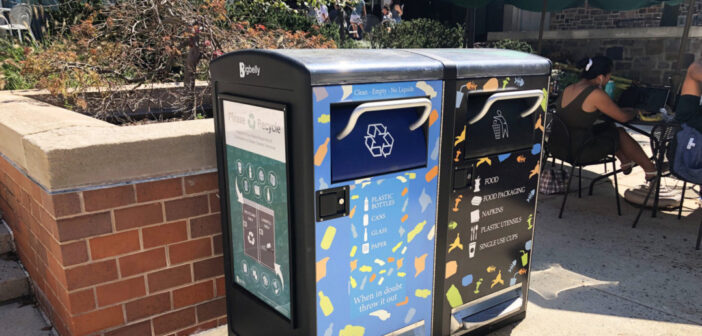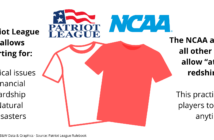In honor of Campus Sustainability Day, Lehigh announced its 2030 Sustainability Strategic Plan on Oct. 28. The plan consists of 113 goals within six focus areas.
Formulated by Lehigh’s Office of Sustainability and Lehigh’s Sustainability Council, the six focus areas include climate action, campus operations, culture and engagement, educational experience, health and wellness, and focused leadership.
While these goals range from being near-term to longer-term, all are intended to be accomplished by 2030.
“Planning documents like this, we typically try to have a slightly longer timeline because you can set big objectives and goals that could not possibly be completed in a year,” said Karen Beck Pooley, Lehigh Sustainability co-chair and a professor of practice in political science. “You want to have a little bit longer to be able to accomplish some big stuff, but at the same time … you start to lose momentum if your time horizon is too long. So, the idea is in 10 years, these goals could be achieved.”
The 2030 plan builds on Lehigh’s previously released 2012 Campus Sustainability Plan and its 2020 Campus Sustainability Plan.
Released in 2016, the 2020 Campus Sustainability Plan was set to expire, leaving the Office of Sustainability and the Sustainability Council with the desire to implement an updated statement with added objectives and goals related to sustainability.
“It was about a 13-month strategic planning process to develop the vision and the goals for the next 10 years for sustainability at Lehigh,” said Sustainability Officer Katharine Targett Gross.
The development of the 2030 Campus Sustainability Plan was a multi-step process.
The Office of Sustainability started by analyzing other universities’ sustainability plans to understand the full spectrum of opportunities that Lehigh had. Based on that information, Targett Gross presented four different model plans to Lehigh’s Sustainability Council, which they then discussed and determined an appropriate direction.
Targett Gross said the state of sustainability at Lehigh was then assessed, with both the operational and academic sides of the institution evaluated to establish a baseline.
“You can’t figure out where you want to go if you don’t know where you currently are,” Targett Gross said.
The Office of Sustainability and the Council of Sustainability then engaged with the campus community through a series of campus workshops, open to faculty, staff and students.
The alumni community was also included in an effort to develop an alumni advisory council for sustainability, which consisted of nine alumni who played a key role in shaping the plan.
Lastly, numerous meetings took place in order to discuss and determine the six focus areas of the plan.
However, this process did not ensue without obstacles.
“The pandemic made this process a bit more challenging,” Targett Gross said. “Some of the goal-setting meetings and buy-in meetings had to be done via Zoom … we weren’t quite through that part of the process yet when the pandemic hit. It sometimes made brainstorming much more difficult without a white board or other physical resources available … but, we were able to adapt.”
In fact, as a result of COVID-19, a number of goals had to be accelerated, while others had to be relaxed, Targett Gross said.
“Goals like developing a telework policy that will reduce commuting emissions were bumped up in time … and then some goals were bumped back a year or two because we need to be able to have a representative sample,” Targett Gross said. “However, it all worked out because it’s a 10 year plan — it won’t impact the longer term goals, so it all balanced out.”
Since the 2030 Sustainability Strategic Plan was announced, some students have expressed support for Lehigh’s commitment to sustainability. Lehigh was most recently ranked as a “silver” institution by the Sustainability Tracking, Assessment and Rating System. The rating system scores universities on a number of areas related to sustainability, with platinum being the highest ranked and bronze being the lowest.
“Many of my personal hopes for a greener campus have been recognized according to this plan, which makes me strongly support it,” said Maddie Malone, ‘22. “By enacting the goals listed, Lehigh could quite potentially become a leading campus in sustainability, a community that I would be proud to be a part of.”
Establishing a set of metrics and indicators for each of the goals, the Office of Sustainability will be able to better determine whether they are on track to meet each goal.
While updates will be released online, annual progress reports will additionally be issued by the Office of Sustainability in October during Campus Sustainability Month.
Lehigh students already expect to see the 2030 Sustainability Strategic Plan result in a number of advances.
“Lehigh’s campus will see a lot of positive change from this plan,” said Ted Renz, ‘22. “Expanding upon Lehigh’s focus on experiential learning through opportunities like research is only one example of the good things coming.”
However, Pooley said, the success of the plan is up to the entirety of the Lehigh campus community.
“It has the power to be a really important document and something that creates a lot of opportunities on campus and makes a lot of positive change,” Pooley said. “It is as important to the Lehigh community as the Lehigh community wants to make it.”






Comment policy
Comments posted to The Brown and White website are reviewed by a moderator before being approved. Incendiary speech or harassing language, including comments targeted at individuals, may be deemed unacceptable and not published. Spam and other soliciting will also be declined.
The Brown and White also reserves the right to not publish entirely anonymous comments.
1 Comment
How about we just improve a Lehigh education!